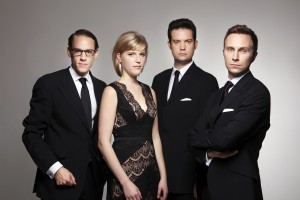CHAMBER MUSIC SOCIETY OF SALT LAKE CITY, Doric Quartet, Libby Gardner Concert Hall, April 10
The field of accomplished string quartets continually keeps getting bigger, with new groups surfacing at a surprisingly rapid pace. Among the ensembles that have emerged in the past decade and a half, the Doric Quartet stands out for its remarkable musicality and interpretative talents. It’s a group that has something to say, and when they do (to paraphrase an old television commerce) audiences listen.
The Doric wrapped up its current tour to the United States Thursday with a concert in Libby Gardner Concert Hall, playing Haydn’s Quartet in C major, op. 76, no. 3; Korngold’s Quartet No. 2, op. 26; and concluding with Schubert’s monumental G major Quartet, D. 887.
Of the three, the Schubert was the least satisfying. While their playing was impeccable, the foursome’s interpretation was at times a bit questionable. That was particularly the case in the second movement Andante, which, while having some nice moments of lyricism in the quieter passages, was rough and rather rambunctious in the forte sections — so much so that the contrasts in this movement were somewhat jarring.
Korngold is, of course, best known to American audiences for his scores to some of Hollywood’s most famous movies of the 1930s and ‘40s. But before coming to the United States, Korngold was a renowned composer of a string of works that assured his place in music history. And while he was working in Hollywood, Korngold continued to write classical works. Among these, from his earliest days in his adopted country, is the Second Quartet.
The Second is a captivating work that blends some serious classical idioms with the more relaxed mannerisms of film music. It’s a successful blend — Korngold, after all, was a master of both worlds — and the Doric pulled it off magnificently. They gave a scintillating account that captured the charm and effusive expressiveness of this work wonderfully. Their nicely articulated interpretation was spot on and they managed to bring depth and dimension to their account.
The real highlight of the evening, though, was Haydn’s quartet that opened the program. This is one of Haydn’s greatest achievements in the quartet medium, and one of his most expansive in terms of temperament. It spans the range of expressions — from carefree exuberance to dark drama — in a cohesive package. The moods are never overdone and the work needs to be played without exaggeration. The Doric understands this and they gave a gorgeously crafted, wonderfully expressed reading that underscored the broad palette of emotions lucidly and intelligently.

